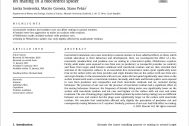Rok
2021Autoři
Mgr. Lenka Sentenská, Ph.D.prof. Mgr. Stanislav Pekár, Ph.D.
Druhy
Philodromus cespitum (Walckenaer, 1802) ESObsah
Insecticide formulations can cause mortality in natural enemies or have sublethal effects on them, which include alterations in their behaviour and development. Here, we investigated the effect of a bioinsecticide (azadirachtin) and predator cues on mating in a biocontrol spider, Philodromus cespitum. Firstly, adult males were exposed to cues from ants (as predators) or conspecific juveniles (as controls) and those from virgin adult females combined with insecticide residues and we then recorded their selection of the respective surfaces. In an insecticide-free environment, males spent significantly more time on the surface with cues from juveniles and virgin females than on the surface with cues from ants and virgin females. In the environment with ant cues, males did not spend significantly more time on the surface treated with water or insecticide residues. Secondly, adult male and female spiders were exposed to cues from predators and conspecifics and fresh insecticide residuals and we recorded mating behaviour. The presence of ant cues nor the presence of insecticide residues had a significant effect on the mating behaviour. However, the frequency of females biting males was significantly lower on the surface with insecticide residues and ant cues and highest on the surface with ant cues and water treatment. The size of mating plugs (applied to female genitals by males during mating) was not different between ant cues and control, but the plugs were significantly larger on the surface with insecticide residues. We conclude that azadirachtin affected only slightly the perception of predation risk and consequently mating behaviour in Philodromus cespitum. Similarly, presence of ant cues had little effect on mating.



